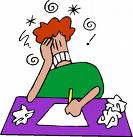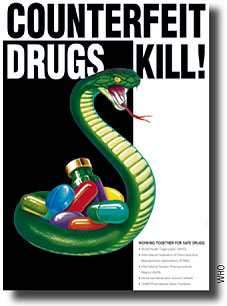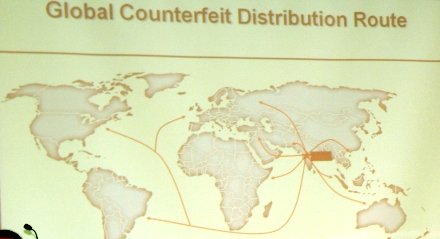The meltdown of financial institutions in the US, toxic mortgages, ethylene glycol instead of diethylene glycol; over-sulphated chondroitin sulphate instead of heparin; and now melamine in infant formula & processed food… Such have been the problems we face with our economy & food/drugs alike.

With globalization and the cycles of world economic downturns eclipsed with hyperflation & ballooning raw materials/commodities/energy costs, the temptation for businesses and officials alike to behave irresponsibly, including corruptions, can predictively be on the rise. With each country rely more and more on one another for their economic well-being in today’s globalized world, such corrupt practices must and can only be addressed at international levels and more crucially enforcement at the same platform.
When in comes to drugs, WHO has arguably been the only world body that provides technical supports and policy guidance for each national government; but WHO lacks the regulatory power to enforce any wrong-doings in healthcare sector. With toxic food and drug products becoming a growing threat to public health, it seems morally necessary to put in legal frameworks for such activities to be controlled and international syndicates criminalized. With those objectives in mind, WHO has established a taskforce called IMPACT (International Medical Products Anti-counterfeiting Taskforce) since 2006.

Working together with INTERPOL and various national law enforcement agencies to ensure that illegal activities and crimes related to pharmaceutical & medical sectors are not left unchecked. Specifically on counterfeit medicines, PSS organized a symposium during the recent FAPA 2008 Congress to heighten pharmacists’ awareness about the scale and modus operandi of the counterfeit drug problems. During the symposium, an INTERPOL officer and an ex-FBI agent were invited to present their experience.

With it’s international network and investigation cum enforcement power, INTERPOL has increasingly stepped in to deal with the staggering extent of drug counterfeiting problem in addition to other international syndicated crimes. While the precise numbers are difficult to estimate, WHO believes that 30% of drugs sold in developing countries are counterfeit; in some parts of Africa, that number could be as high as 90%; with possibly hundreds of thousands of deaths each year as a result.
Unlike other crimes like smuggling of narcotics, weapons, money laundering, vice etc., the punishments for counterfeit drugs have been mild and by today’s economic standards, grossly inadequate. That probably explains why the situation seems to worsen as international syndicates have noticed the deficiencies and exploited such legal loopholes. Contrary to many people’s belief, counterfeit drugs can be more than just the expensive, life-style drugs for ED, CVA etc., the syndicate will peddle anything which has demands - be it proprietary drugs, generics, life-saver or just simple supplements. Ronald Noble, the secretary general of INTERPOL, recently told a conference that counterfeit drugs are believed to be the reason behind 200,000 of the 1 million deaths that result from malaria each year.
In many developing countries, eg. in Africa, where corruption is rife, the sale of unregulated medicines is particularly troublesome. Because poverty is so endemic, people are desperate to find the cheapest medicine possible. And because salaries are so low, customs and police officers often take part in the illicit trade. The international corruption watchdog Transparency International released its 2008 "Bribe Payers Index," in which pharmaceutical & medical sector was one of the sectors rated to be most prone to corruption.
That said, we are all consumers of health products at some stage of our life. The last thing we want is to be unwittily or deliberately given something which is counterfeit; especially at the crucial moments when our life needs the therapeutic power of the drug which will decide the outcome our treatment, or in many instances, even our life or death....!
For that, we as pharmacists, regardless of where we work - in R&D, QA, supply chain & logistics, policies & planning, procurement, pharmaceutical care, regulatory & compliance, or even education etc - we all have a crucial role to play in order to ensure that our patients and the public gets their drugs which heal and not harm them further.
Happy New Year!
Ng Cheng Tiang
PSS 102nd Council.
**********


